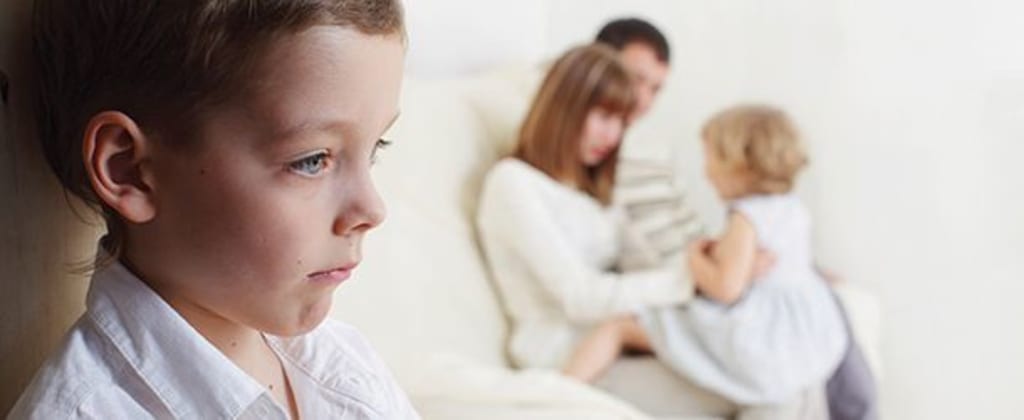
Entry 2: January 25th, 2018
When it comes to siblings, I'm sure we all knew deep down our parents picked their favorites. Parents don't mean to, but we're human, it's natural for it to happen. And even then, usually the favorites can be broken down to as simple as, "my favorite to go grocery shopping with," "my favorite with school," etc. But in the end, we all pick favorites. After all, part of life when you date/get married is picking your favorite human being to spend your life with, right?
Either way, this isn't a story about when your parents pick favorites as much as it is when your BPD mother clearly divides her children into two separate categories. Those two categories are All Good children and No Good children. Now, this doesn't stick permanently, per se, but your parent is likely to stick you dominantly as one type. In case you haven't noticed, I personally was thrown into the No Good category. How is that? you're probably wondering. Well, pretty easily, I must admit. It didn't take too much to get on that list.
What is an All Good child?
An All Good child is characterized as this: the child who can do no wrong and will defend their Borderline Parent to the ends of the Earth. Ever loyal, the All Good child is very close to their Borderline Parent and is heavily praised and doted on. The parent fawns over the child, as they typically see all of their own personal good characteristics on that child, and want to build on that. To put it another way, this is the sibling that gets away with everything under the sun, and the parent makes excuses for them or turns a blind eye.
We all have that sibling, but don't jump to conclusions! This isn't a sign of BPD, as we know, this is also just favoritism. However, there is a certain behavior that All Good children exhibit that shows when it becomes closer to a BPD Parent and All Good child relationship. When the child goes to great lengths to take care of the parent, defend them against everything because of how much faith and trust the parent puts in them (and if they are a Waif, as described in my previous article, we already know how "Woe is me! Everyone is always out to hurt lil ole me!" a Waif can be.) and they will turn on anyone the parent tells them to, including their other parent and siblings. They get to be the Golden Child, the perfect model.
This does not completely bode well for them, as All Good children may be the ones the parent tries to project themselves on and live their lives through them. You know, the lives they may not have gotten to live, in that "your accomplishments are mine" kind. They may also be the child who can become highly successful but fears success if they have witnessed the abuse their "no good" sibling gets and feels guilt.
What is a No Good child?
Now that you've seen the All Good, it may be pretty easy to know the No Good. However, always best to show it anyway. The No Good Child is treated as the bad one, the black sheep, and disappointment. This is the child that is usually seen as the one who will always fail the Borderline Parent, the one who causes the most grief, and the betrayer. Trust and control are vastly important to BPD parents, as this is something they hold very close to them. Without it, they lash out. Being a No Good child means they can no longer trust that child, or that child is not giving them the control they want. I personally was someone who questioned my Borderline Mother because there were many times where her contradictions and rules didn't make any sort of sense, or I didn't like how she was doing something when I knew of a way that would be more beneficial. It drove her crazy when I did things like that as I started diminishing her control.
This is when No Good children are actually becoming more independent. Their Borderline Parent isn't coddling them and telling them how much of an amazing son or daughter they are, but instead, they are belittling, berating and ruthless to the No Good children. They have no chance of overcoming that without succumbing to their Borderline Parent's control and twisted sense of, "either you agree with me or you're my enemy" thought process instead of understanding that they are an independent child that still wants the love and affection of their parent. It's rough.
No-Good children may feel a need to constantly try to be better, go above and beyond, but may never actually be recognized for their help or achievements. They are so used to getting punished, they become numb to the punishments, whether they are physical beatings or groundings. I got mostly groundings, but I am no stranger to the occasional slaps across the face. No Good children are so used to these, that they don't even really acknowledge in a way, which may anger the parent and fuel the rage, making them more dangerous. I remember how my groundings went pretty quickly from a few weeks to whole semesters of school, because of one forgotten assignment.
This is what I can tell about our two main types of children in the eyes of Borderline Parents.
What do you have to add, and are you a child of a Borderline Parent?
And now for the SOD (Song Of the Day):
"Picture picture, smile for the picture, Pose with your brother, Won't you be a good sister?"About the Creator
Lulu Rose
A writer, a student, a girlfriend, a lover and a fighter. And somewhere in between a geek with a love of video games, Supernatural, and WWE. Yeah, she's a little bit of everything.






Comments
There are no comments for this story
Be the first to respond and start the conversation.